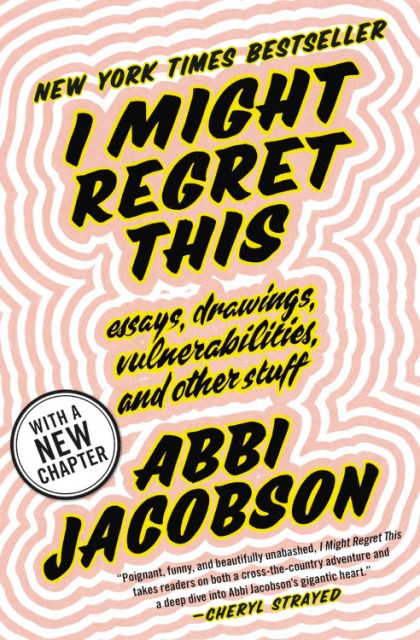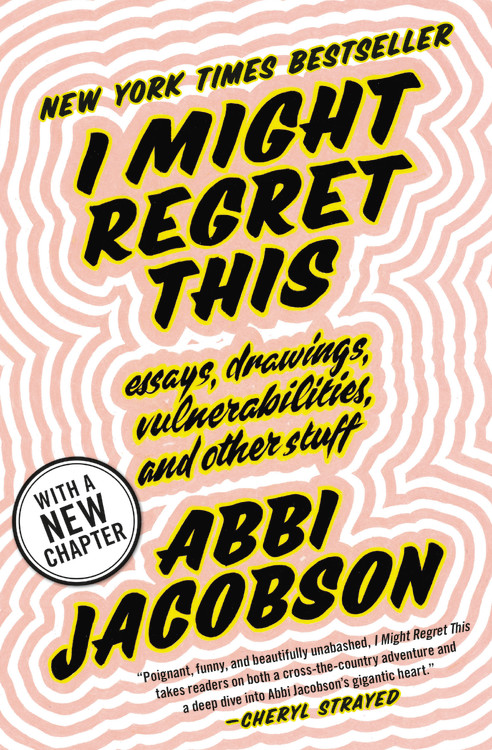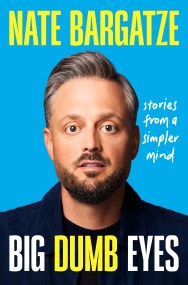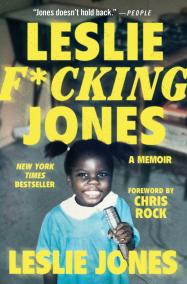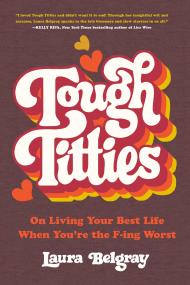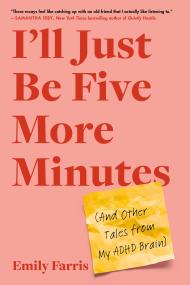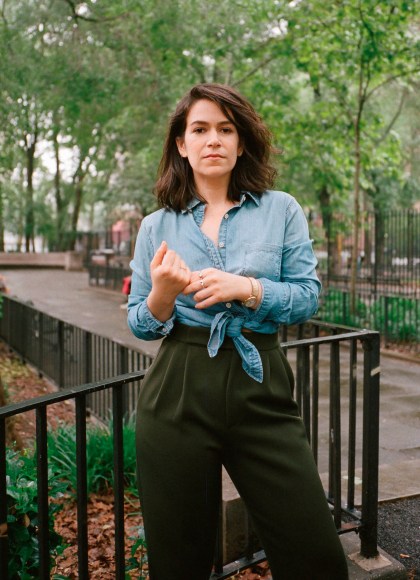By clicking “Accept,” you agree to the use of cookies and similar technologies on your device as set forth in our Cookie Policy and our Privacy Policy. Please note that certain cookies are essential for this website to function properly and do not require user consent to be deployed.
I Might Regret This
Essays, Drawings, Vulnerabilities, and Other Stuff
Contributors
Formats and Prices
- On Sale
- Sep 24, 2019
- Page Count
- 336 pages
- Publisher
- Grand Central Publishing
- ISBN-13
- 9781538713273
Price
$16.99Price
$22.99 CADFormat
Format:
- Trade Paperback $16.99 $22.99 CAD
- ebook $11.99 $15.99 CAD
- Hardcover $38.00 $48.00 CAD
- Audiobook Download (Unabridged)
This item is a preorder. Your payment method will be charged immediately, and the product is expected to ship on or around September 24, 2019. This date is subject to change due to shipping delays beyond our control.
Buy from Other Retailers:
When Abbi Jacobson announced to friends and acquaintances that she planned to drive across the country alone, she was met with lots of questions and opinions: Why wasn’t she going with friends? Wouldn’t it be incredibly lonely? The North route is better! Was it safe for a woman? The Southern route is the way to go! You should bring mace! And a common one… why? But Abbi had always found comfort in solitude, and needed space to step back and hit the reset button. As she spent time in each city and town on her way to Los Angeles, she mulled over the big questions — What do I really want? What is the worst possible scenario in which I could run into my ex? How has the decision to wear my shirts tucked in been pivotal in my adulthood?
In this collection of anecdotes, observations and reflections–all told in the sharp, wildly funny, and relatable voice that has endeared Abbi to critics and fans alike–readers will feel like they’re in the passenger seat on a fun and, ultimately, inspiring journey. With some original illustrations by the author.
Genre:
-
"Poignant, funny, and beautifully unabashed, I Might Regret This takes readers on both a cross-the-country adventure and a deep dive into Abbi Jacobson's gigantic heart."Cheryl Strayed
-
"As a passionate fan of Abbi Jacobson's comedy, it was no surprise to me that this book is hilarious, peculiar, and very smart. But I was unprepared for the courage she shows in making herself vulnerable on these pages: Jacobson cracks herself open and explores love and loneliness, travel and independence, success and self-loathing. I wish I hadn't finished reading this...I miss her already."Ariel Levy, New York Times bestselling author of The Rules Do Not Apply
-
"Intimate and brave in a way her audience has yet to experience, I Might Regret This is a funny, vulnerable, generous, and excruciatingly honest look at the beautiful heart that beats inside Abbi Jacobson."Samantha Irby, New York Times bestselling author of We Are Never Meeting in Real Life and Meaty
-
"Anyone who has had their heart broken will recognize the emotional contours of Abbi Jacobson's post-breakup cross-country road trip...A sweetly wistful collection which includes her hand-drawn illustrations."Washington Post
-
"Jacobson was seeking to establish a 'small, meaningful connection with a stranger,' and that's exactly what she did. And that is exactly what she's done here, with each one of her readers."The New York Times Book Review
-
"A truly exceptional memoir...Jacobson is tuned into the ways that physical objects, details, smells and tastes shape the bigger things in our lives. Our loves, our insecurities, our heartbreaks, our griefs: She understands that these things are intricately constructed, that their incongruities and moments of humor lend them texture and weight. The ability to understand that sadness and joy and ridiculousness are necessarily intertwined: This is what has always made Jacobson's comedy so tenderly funny. Like "Broad City," I Might Regret This is in a league of its own."Michigan Daily
-
"While asking many questions about adulthood--like what the impact of tucking in her shirt has had on her life--Abbi Jacobson infuses her sharp and witty voice to tell stories about loss, love and finding yourself."TIME.com
-
"Part travelogue, part diary, you come for the delightful observations about road snacks and the life-changing magic of tucking in your shirt, and stay for the endearingly honest, quirky reflections on life, love, art, and work."Queerty
Newsletter Signup
By clicking ‘Sign Up,’ I acknowledge that I have read and agree to Hachette Book Group’s Privacy Policy and Terms of Use
